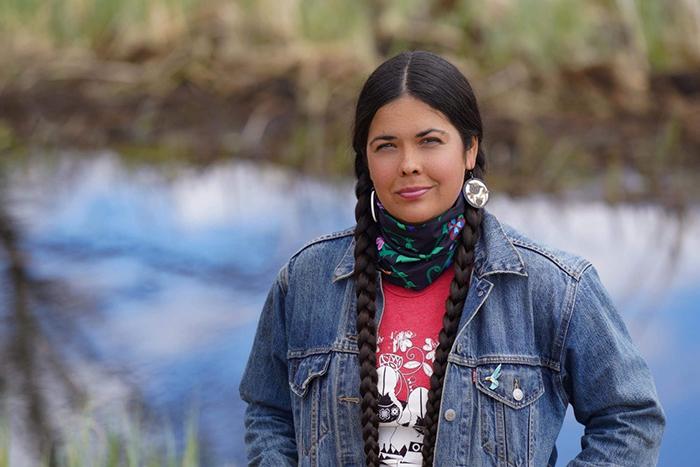
- Details
- By Darren Thompson
“I’m from a rural border town and grew up next to a big lake in a 1970s trailer house, in the forest where it’s still beautiful,” said Tara Houska told Native News Online. “I never dreamed of this kind of recognition, what a wild journey. Deepest gratitude to everyone who has helped me along the way.”
Houska embedded herself in opposing the Line 3 oil pipeline expansion project in northern Minnesota and the Dakota Access Pipeline near the Standing Rock Indian Reservation. She founded the Giniw Collective, an Indigenous women and two-spirit-led resistance dedicated to defending spaces sacred to Indigenous people, advocating for systemic change that respects Indigenous sovereignty, prioritizing land defense, traditional knowledge, and divestment of fossil fuels to protect the Earth.
Houska, a Couchiching First Nations citizen, grew up in Ranier, Minnesota, near the border of Couchiching and earned a B.A., B.S., and J.D. from the University of Minnesota. She went to practice law in Washington, D.C. and clerked in the Obama Administration. Houska also co-founded Not Your Mascots, a non-profit organization that aims to educate the general public on the use of Native American mascots in sports and media. She has contributed op-eds to All We Can Save, The New York Times, CNN, Vogue, and MSNBC. She is a TED speaker and recipient of the 2021 American Climate Leadership Award and the 2019 Rachel’s Network Catalyst Award.
“It’s been my honor to pick up the mantle of so many who came before and keep pushing for space for Indigenous peoples, for nature, for dignity and empathy to be heard and respected,” Houska said. “To push for actions, not just words—for my baby and all those generations to come.”
Houska joins previously honored climate advocates, including Elizabeth Kolbert, Mark Ruffalo, Bill McKibben, and Lisa Jackson. Recipients are carefully vetted and selected by a committee including environmental science faculty, the provost and several leaders in environmental organizations, including a co-founder of the Natural Resources Defense Council. She will be accepting this prestigious recognition at Dickinson’s Commencement on Sunday, May 21.
More Stories Like This
Gwich'in Tribal Governments Submit Comments Challenging Fish and Wildlife Service's Inadequate Environmental Review of Arctic Refuge Snow RoadRappahannock Tribe Challenges 9M-Gallon Water Plan
Feds release draft long-term plans for Colorado River management
Apache Leader Walks 60 Miles to Court Hearing That Will Decide Fate of Sacred Oak Flat
Rappahannock Tribe Raises Sovereignty and Environmental Concerns Over Caroline County Water Permit
Help us defend tribal sovereignty.
At Native News Online, our mission is rooted in telling the stories that strengthen sovereignty and uplift Indigenous voices — not just at year’s end, but every single day.
Because of your generosity last year, we were able to keep our reporters on the ground in tribal communities, at national gatherings and in the halls of Congress — covering the issues that matter most to Indian Country: sovereignty, culture, education, health and economic opportunity.
That support sustained us through a tough year in 2025. Now, as we look to the year ahead, we need your help right now to ensure warrior journalism remains strong — reporting that defends tribal sovereignty, amplifies Native truth, and holds power accountable.
 The stakes couldn't be higher. Your support keeps Native voices heard, Native stories told and Native sovereignty defended.
The stakes couldn't be higher. Your support keeps Native voices heard, Native stories told and Native sovereignty defended.
Stand with Warrior Journalism today.
Levi Rickert (Potawatomi), Editor & Publisher

